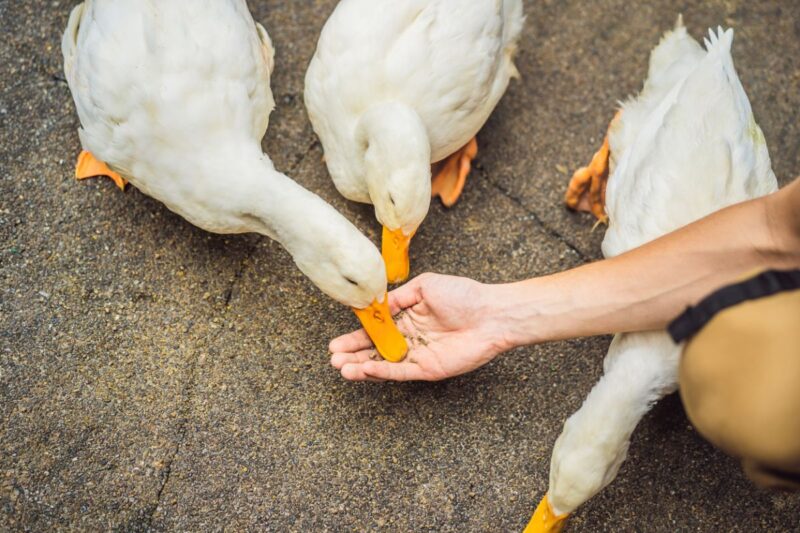Ducks are adorable and charismatic waterfowl that often capture our hearts with their charming quacks and waddling walks. Many of us enjoy feeding these feathered friends when we visit ponds or lakes. But have you ever wondered, can ducks eat apples?
In this blog post, we will answer this question and provide you with valuable insights into the dietary habits of these birds.
Are Apples a Safe Option?
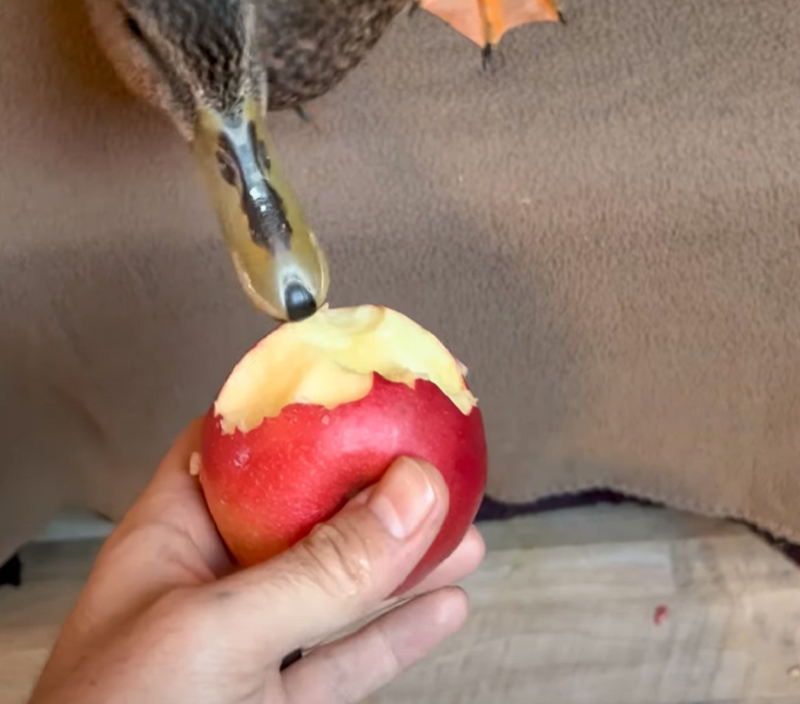
Ducks are known to consume a variety of fruits, including apples, but there are some important considerations to keep in mind:
- They can eat apples, but it’s crucial to offer them the right type of apple. Avoid feeding them apples with pesticides or any chemicals on the skin. It’s best to provide organic apples or thoroughly wash and peel them.
- Ducks have relatively small bills and may have difficulty consuming whole apples. To make it easier for them to eat, cut the apples into small, bite-sized pieces. They can choke on large chunks, so be sure to provide appropriately sized portions.
- While apples can be a tasty treat for ducks, they should be given in moderation. These birds require a balanced diet to stay healthy, so don’t make apples a primary food source. Offer a mix of fruits, vegetables, and their natural diet for a well-rounded nutrition plan.
- Ducks, like any other animals, prefer fresh food. If the apples have gone bad or started to rot, do not feed them to the birds, as this can be harmful to their health.
- Always provide them with access to clean fresh water alongside any food you offer. They need water to swallow and digest their food properly.
Nutritional Value
Apples can be a nutritious addition to a duck’s diet when given in moderation. Here are some nutritional benefits of this fruit for ducks:
| Nutrient | Benefits for Ducks |
|---|---|
| Vitamin C | Boosts the immune system |
| Vitamin A | Supports vision and skin health |
| Dietary Fiber | Aids in digestion and promotes a healthy digestive system |
| Hydration | Helps keep ducks hydrated, especially in hot weather |
| Antioxidants | May protect ducks from oxidative stress and support overall well-being |
| Energy | Provides a quick source of energy, useful during migration or cold winter months |
Ducks’ Natural Diet
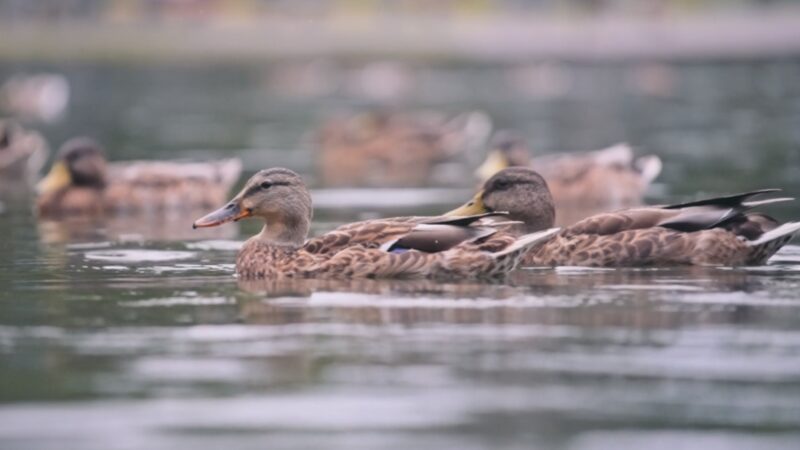
Ducks are omnivorous birds, meaning they consume a varied diet consisting of both plant and animal matter. Their typical diet includes:
- Aquatic Plants: Ducks primarily feed on aquatic plants like duckweed, water lilies, and various submerged vegetation. These plants provide essential nutrients and energy for their daily activities.
- Insects: These birds are opportunistic feeders and often enjoy munching on insects, larvae, and other small invertebrates. This source of protein helps them meet their protein requirements.
- Small Fish: Some duck species incorporate small fish, tadpoles, and fish eggs into their diet. This provides them with additional protein and essential fatty acids.
- Algae and Microorganisms: Ducks also consume algae and microorganisms found in water bodies, which contribute to their overall nutrition.
Although apples can provide some nutritional benefits and serve as a tasty treat for our feathered friends, always remember that a diverse diet that mimics their natural food sources is the key to keeping these birds healthy and happy.
Common Misconceptions
Feeding ducks is a popular pastime for many people, especially families with children. However, there are several misconceptions and myths surrounding duck feeding that need to be addressed to ensure the well-being of these waterfowl. Let’s bust some of these myths:
Myth 1: Feeding Bread to Them is Harmless
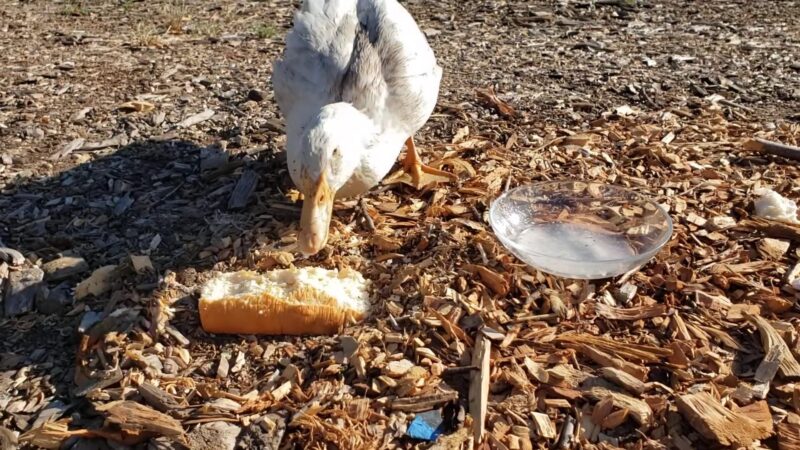
One of the most common misconceptions is that feeding bread to ducks is harmless and even beneficial. In reality, bread is not a suitable food for these birds for several reasons: Bread lacks essential nutrients that ducks need for their health. Feeding them bread can lead to malnutrition.
These birds have difficulty digesting processed foods like bread. It can cause digestive issues and lead to “angel wings,” a deformity in ducklings’ wings. Leftover bread in water bodies can contribute to water pollution, harming not only ducks but also the aquatic ecosystem.
Myth 2: Ducks Can Digest Anything
While they are omnivorous and have a varied diet, it doesn’t mean they can digest anything. They should not be given foods like chocolate, avocado, or anything high in salt or sugar, as these can be toxic to them.
Myth 3: Feeding Ducks Human Food is Fine
Feeding ducks human food, such as chips or fast food leftovers, is not recommended. These foods are often high in salt and unhealthy fats, which can be harmful to them. Stick to natural and duck-friendly foods like peas, corn, lettuce, and yes, the occasional apple slice.
Myth 4: Ducks Don’t Need Water to Swallow
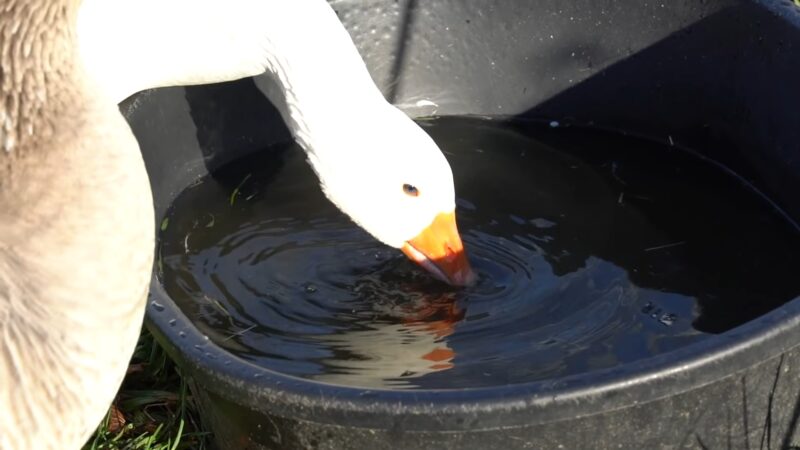
Contrary to popular belief, they do need water to swallow their food properly. Feeding them dry food can lead to choking and other health issues. Always provide them with access to clean fresh water when offering them food.
Myth 5: Feeding Ducks Helps Them
While it’s true that feeding these birds can provide them with food, it can also lead to problems. Overreliance on human-provided food can disrupt their natural foraging behavior and make them dependent on handouts. It’s better to supplement their diet rather than replace it entirely.
Responsible Feeding Tips
Now that we’ve debunked some common myths, let’s discuss responsible duck-feeding practices to ensure the well-being of these lovely birds:
- Stick to duck-friendly foods like peas, corn, lettuce, and small pieces of fruit like apples. These foods are more nutritious and easier for ducks to digest.
- Don’t overfeed them. A little treat is fine, but excessive feeding can lead to obesity and health problems.
- Always provide them with access to clean fresh water. They need it to swallow their food and stay hydrated.
- Encourage natural foraging behavior by offering food that simulates their natural diet. This helps them maintain their hunting instincts and overall well-being.
- Avoid crowding ducks while feeding them. Too much human interaction can cause stress and make them less self-reliant.
- If you see someone feeding ducks harmful foods like bread, politely educate them about the importance of proper duck nutrition.
Feeding these birds can be a rewarding experience, but it’s crucial to do it responsibly to ensure the health and happiness of these beautiful birds.
FAQs
Can ducks eat grapes?
Yes, they can, but like apples, grapes should be offered in moderation and cut into small pieces to prevent choking. Grapes can be a tasty and nutritious treat.
What vegetables can ducks eat?
They can eat a variety of vegetables, including peas, corn, lettuce, and spinach. These vegetables are nutritious and easy for ducks to digest. Avoid giving them vegetables that are high in oxalates or other potentially harmful substances.
Can ducks eat apple peels, or should I peel the apples before feeding them?
Yes, they can, and in fact, the peels contain additional nutrients and dietary fiber. You can leave the peels on the apples.
Are there any signs that indicate ducks have eaten too many apples?
They may experience digestive upset, including diarrhea. To avoid this, always provide apples in moderation and observe the birds for any signs of discomfort.
Can baby ducks eat apples, or should I wait until they are older?
Yes, but they should be cut into very small, manageable pieces to prevent choking. Start with small amounts and gradually increase as they grow older and can handle larger food pieces.
Conclusion
In conclusion, ducks can enjoy apples and a variety of other fruits and vegetables as part of their diet, provided it’s done in moderation and with care. However, it’s crucial to dispel common misconceptions, such as the harmfulness of bread, and promote responsible feeding practices.
By following these guidelines and providing these birds with a balanced diet that mimics their natural food sources, you can contribute to the well-being of these charming waterfowl and enjoy their company at your local pond or lake.
